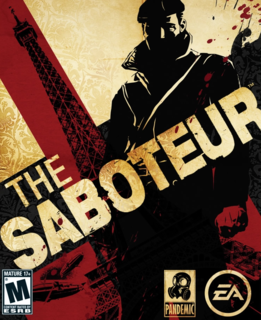ready to end the war.
Judged on its feature set alone, The Saboteur is remarkable. An open world game set at the turn of the Second World War, it offers as its playpen a Paris in the first throes of Nazi occupation. It's an expansive playpen too, stretching to the seaside town of Le Havre and taking in the more rustic delights of Bourgogne and the Champagne-Ardenne among others, giving a microcosm of central France that's incredibly generous.
It's a frequently characterful setting as well, with the city and its surrounds seen through a comic filter. There's colour as well, but only when it's been earned – areas of the map that are under heavy Nazi occupation are drained to black and white, and its only after enough resistance is made that they bloom back to vibrant life.
But before all this there's a preamble introducing the key players in The Saboteur's story in an agreeably breezy fashion. Set in a rural idyll immediately prior to the outset of the Second World War, it lets players witness the war machine rolling into action and sets up the tale that's at the heart of the game's lengthy campaign. It's here that we first meet Sean Devlin, an Irish racing driver loosely inspired by William Grove Williams, the winner of the inaugural Monaco Grand Prix, and it's here that we see his fate set in motion as he witnesses the brutal slaughter of his closest friend.
By the time Paris is reached, the war is in full effect, and here Devlin finds his true calling as a saboteur. It's a fantastic premise that's met with some equally fantastic ideas, as the covert nature of the game is served by a series of neat mechanics. There's a thin thread of stealth that runs through The Saboteur, flourished with the ability to disguise as a Nazi soldier and facilitated by a suspicion meter that echoes Assassin's Creed.
The meter is fuelled by various acts – though the Nazis will sooner call you up for jumping a fence than slaughtering a pedestrian, perhaps in keeping with their cold-blooded nature – and when maxed out it triggers an alert system that's superficially similar to GTA IV, with escalating alarms and ever increasing search perimeters to escape from.
True to the tendencies shown by Pandemic in the Mercenaries games, there are also a lot of things to blow up, from sniper points to fuel dumps and outposts. Quell the Nazi forces enough and colour is restored to the area as the resistance strengthened, with pockets of fighters available to call upon in the heat of a firefight.
Underneath all of this, there's a perk system that informs The Saboteur's trinity of driving fast, shooting Nazis and blowing things up, with new moves and abilities steadily unlocked throughout the game's progression. It's backed up by myriad merchants dotted around the map, with arms dealers selling trading wares from guns and explosives while garages act as spawn points for cars – meaning that nearly every corner of The Saboteur's Paris offers something to engage the player.
But while Pandemic has succeeded in creating a sandbox that's bustling with past-times and pursuits, the tools it provides are woefully bent out of shape. Devlin himself is the chief culprit and, from the moment he first opens his mouth, he marks himself out as a creation that's hard to warm to. A grab-bag of clichés delivered with a grotesque imitation of an Irish accent, The Saboteur stops short of giving him a pot of gold and a safe house at the end of a rainbow, but only just.
He's little better when he's mute and at the player's command. We've been spoilt these past few months, with Uncharted 2's Nathan Drake demonstrating mastery of cover-based shooting and Assassin's Creed 2's Ezio proffering open world athleticism, but even though it's understandable that Devlin is the measure of neither it's less excusable that he's not a match for the stars of last generation's games.
Get behind the wheel of a car to escape and it gets poorer still. Each vehicle in the game is joyless to drive, with a low centre of gravity across the board ensuring they're sucked free of either fun or any realistic attributes. What's worse is their complete lack of damage modelling – subject them to enough gunfire and they'll eventually set alight and explode, but drive them at full pelt into a wall and they'll be unscathed. It's a strangely retrograde aspect of The Saboteur, and one that perhaps belies that this was released before it was ready.
All this and we've yet to address The Saboteur's biggest failing – it's story. A tonal mess, The Saboteur shoots for high camp but massively misses its mark, the end result a succession of atrocious stereotypes that are fed some equally dire dialogue, peppered with swearing and sexual innuendo that smacks of adolescent desperation. Bare breasts and crude cusses suggest it's got its tongue firmly in its cheek, but it never elevates from the realms of the puerile. It's like Allo Allo with tourette's syndrome, though it's no way near as fun as that pairing sounds.

